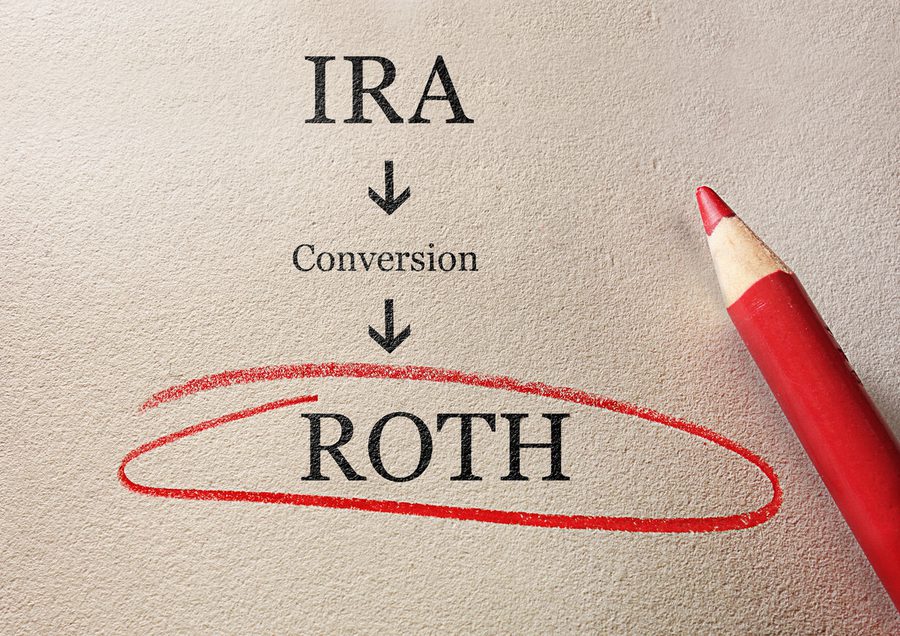
When considering if a Roth Conversion is right for you, it's important to evaluate your current financial situation, future income expectations, and long-term retirement goals. We encourage you to seek the guidance of a financial professional to review the complexities of this strategy. That said, here's an informative introduction to the Roth Conversion strategy — how it works, why one would consider taking advantage of it, and when it could make the most sense to be considered.
You might have heard of a tax-planning strategy known as a Roth Conversion. Given the right circumstances, this strategy can help you or your heirs reduce your tax burden and increase usable after-tax dollars.
When considering if a Roth Conversion is right for you, it's important to evaluate your current financial situation, future income expectations, and long-term retirement goals. We encourage you to seek the guidance of a financial professional to review the complexities of this strategy. That said, our intent is to introduce the Roth Conversion strategy by providing an overview of how it works, why one would consider taking advantage, and when it could make the most sense to be considered.
What is the difference between a Traditional IRA/401(k) and a Roth IRA?
First, we will review the two tax buckets involved with completing a Roth Conversion:
Traditional IRA/401(k)
- Funded with pre-tax dollars.
- Withdrawals from these accounts are taxable.
- Required Minimum Distributions (RMDs) start at age 73.
Roth IRA/401(k)
- Funded with after-tax dollars.
- Withdrawals after age 59½ are 100% tax-free in most cases.
- No Required Minimum Distributions during your lifetime.
What is a Roth Conversion?
Here are key features of the strategy:
- A Roth Conversion is the process of transferring funds from a tax-deferred retirement account, such as a Traditional IRA/401(k), to an after-tax Roth IRA/401(k).
- You pay taxes the year you complete the conversion because the money was withdrawn from the pre-tax bucket (i.e., the Traditional IRA/401(k)).
- Premature withdrawal penalties do not apply at the time of the conversion regardless of your age (i.e. you can do a conversion prior to age 59½).
- You can convert a portion of your account; it is not an “all or nothing” transaction.
- You can complete a conversion in any given year, for any amount, limited only by the value of your pre-tax retirement assets.
- Converted amounts are not limited by, nor do they count toward your Roth IRA contribution for the year.
When is a Roth Conversion Most Advantageous?
The availability of a potential tax-saving strategy does not mean it will work to your best advantage in every circumstance. However, here are some considerations that could help you maximize the tax-saving impact of a Roth Conversion:
- Lower Tax Bracket this Year: Pay your taxes when your tax rate will be the lowest. Remember, when you do a Roth Conversion, you pay the taxes now. If you are likely to be at a higher tax rate in the future, it might be wise to withdraw funds from your IRA now, pay the taxes, and converting them to the tax-free Roth bucket. By converting them to a Roth, you (and your heirs) will receive tax-free growth and tax-free distributions in the future in most cases. Here are examples of life events that may lower your tax bracket:
- Being between jobs, laid off, or taking a sabbatical.
- Taking a large loss for a business you own.
- Lower than usual income for a variety of reasons.
- In retirement but before Required Minimum Distributions begin (currently, age 73).
- In retirement but before Social Security or a pension starts.
- Goal: Minimize Tax Impacts to Heirs: If you have as a goal to leave money to heirs unencumbered by tax drag, this will make Roth Conversions more advantageous to achieve that end. The longer your investment horizon (through your lifetime, and on to your heirs’ distribution period), the more advantageous a Roth conversion may be.
- Take Advantage of Market Downturns: In times when the market declines significantly, the tax advantages of a Roth Conversion are augmented as you convert and pay taxes on depressed assets, which then grow back tax-free as the market recovers.
When would a Roth Conversion make the most sense?
Deciding when to do a Roth conversion involves a blend of financial analysis, tax strategy, and financial planning. Consult with your financial strategist for personalized guidance. Through careful planning, a Roth Conversion could save you and your heirs considerable money in the long-run by reducing total taxes, enhancing after-tax compounded growth, and supplying a tax-free income source for you and your heirs in the future.
If you have questions about Roth Conversions, the McKinley Carter team is available to assist. Just reach out using our Contact form. We also encourage you to visit our INSIGHTS library to explore other financial topics of interest.
*Note: This information is based on current tax law (July 2024).
